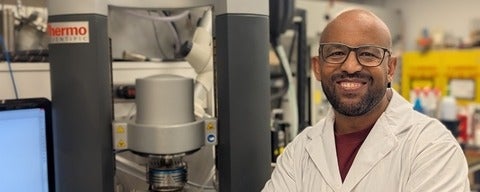Welcome to Chemical Engineering at the University of Waterloo
The department's small class-sizes, engaging teaching practices, and hands-on learning in our state-of-the-art facilities empower our students to solve real-world problems.
The Department of Chemical Engineering is a vibrant center of collaborative research addressing some of the most pressing challenges in energy and materials. Our faculty members are engaged in a diverse array of research in areas such as machine learning and process systems engineering, CO2 capture and conversion, polymer engineering, renewable energy, synthetic biology, environmental remediation, and materials science that push the boundaries of innovation.

Find out more by exploring the programs, research and news stories on this site.
News
Pendar Mahmoudi wins two teaching excellence awards
The Department of Chemical Engineering is proud to announce that Professor Pendar Mahmoudi is the 2025 recipient of the Faculty Teaching Excellence Award and the Boyce Family Teaching Award.
"I feel truly honoured and humbled to win these awards. Getting rewarded for a job I enjoy is a blessing. I am extremely thankful for the support of my colleagues in the department, who will happily listen to new ideas or issues and offer assistance or advice," says Mahmoudi.
The Faculty Teaching Excellence Award is adjudicated by program chairs and directors, whereas the Boyce Family Teaching Award is a student-driven award.
Although judged by very different groups, they both reached the same conclusion that Mahmoudi’s teaching methods successfully incorporate experiential learning, innovative teaching and commitment to student connection and success.
Mahmoudi began teaching in 2018 after finishing her PhD at the University of Waterloo. It was during her graduate studies that she discovered her passion for teaching.
A greener future for personal hygiene products
A chemical engineering research group led by Professor Tizazu Mekonnen has developed an eco-friendly super absorbent hydrogel that could dramatically reduce the environmental impact of personal hygiene products like diapers, menstrual pads and tampons.
Unlike current products, which take centuries to break down, this new material degrades harmlessly in soil within three months.
In North America, billions of disposable diapers end up in landfills annually, according to the U.S. Environmental Protection Agency (EPA) taking up to 450 years to decompose.
Around 1.8 billion women menstruate monthly, and most single-use menstrual pads and tampons also end up in landfills. These products are about 90 per cent plastic and can take up to 500 years to break down, according to the United Nations Environment Programme.
Chemical engineering team excels in circular water economy challenge
A team of graduate students from the Department of Chemical Engineering earned an impressive second place in the WEF Technical Exhibition and Conference (WEFTEC).
The student team, supervised by Professor Sarah Meunier, first won the Water Environment Association of Ontario (WEAO) competition. The contest, a municipality that provides a current and relevant problem. After that the team, sponsored by WEAO moved on to a second-place win at WEFTEC.
WEFTEC is the largest water quality exhibition in North America, and they hold an annual international student competition. The University of Waterloo team, which included Joseph Wortman, Rosa Maria Castillo, Maryory Ocana and Jinxuan Zhang competed against students from universities from across North America in the new Circular Water Economy category.
The teams were tasked with optimizing a wastewater treatment plan in Barrie. One of the biggest real-world hurdles is that Barrie expects its population to double by 2051, but the treatment plant itself has no room to grow.
Events
PhD Comprehensive/Pervaporation Separation of Heteroaromatic Organic Compounds from Coking Wastewater Using PEBA-2533 Membranes by Yixuan Wu
Pervaporation Separation of Heteroaromatic Organic Compounds from Coking Wastewater Using PEBA-2533 Membranes
PhD Comprehensive/Examine the biochemical and biomechanical effects of Descemet's membrane on human corneal endothelial cell responses in an in vitro model by Lexie Xi
Examine the biochemical and biomechanical effects of Descemet's membrane on human corneal endothelial cell responses in an in vitro model













